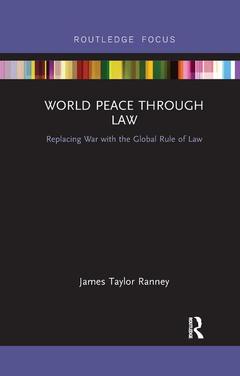Description
World Peace Through Law
Replacing War with the Global Rule of Law
Author: Ranney James Taylor
Language: English
Subjects for World Peace Through Law:
Keywords
International Dispute Resolution System; International Dispute Resolution; World peace through law; Alternative Dispute Resolution; Nuclear Weapons Freeze Campaign; World Court; Compulsory Dispute Settlement Procedures; mediation; United Nations Peace Force; negotiation; International Dispute Resolution Mechanisms; arbitration; Alternative Dispute Resolution System; international law; International Peace Force; nuclear abolition; American Peace Movement; Alternative Dispute Resolution Mechanisms; Global Dispute Resolution; UN; International Police Force; Compulsory Negotiation; ICJ; Bentham’s Proposal; Compulsory Mediation; International Legal Scholars; Effective Enforcement Mechanisms; Secretary Of State; Current International Law; Complete Disarmament; Compulsory Jurisdiction; Peace Force
Approximative price 25.19 €
In Print (Delivery period: 14 days).
Add to cartPublication date: 05-2019
· 13.8x21.6 cm · Paperback
Approximative price 61.25 €
In Print (Delivery period: 14 days).
Add to cartPublication date: 09-2017
· 13.8x21.6 cm · Hardback
Description
/li>Contents
/li>Readership
/li>Biography
/li>
This book deals with the history and future of the concept of ?world peace through law? (WPTL), which advocates replacing the use of international force with the global rule of law.
WPTL calls for replacing war with the global rule of law by arms reductions, including the abolition of nuclear weapons, global alternative dispute resolution mechanisms, and various enforcement mechanisms. This book sets forth a three-part proposal: 1) arms reductions ? primarily the abolition of nuclear weapons, with necessarily concomitant reductions in conventional forces; 2) a four-stage system of global alternative dispute resolution (ADR), utilizing both law and equity; 3) adequate enforcement mechanisms, including a UN Peace Force. The core of this proposal is alternative dispute resolution mechanisms?international ADR. International ADR would consist of a four-stage process of compulsory negotiation, compulsory mediation, compulsory arbitration., and compulsory adjudication by the World Court. The fundamental proposition of this book is that the use of alternatives to war, global ADR, is the ultimate solution to the problem of peace. The full implementation of WPTL will entail a vast array of progressive initiatives on many fronts, including abolition of nuclear weapons, with the global rule of law being the capstone to all of these developments.
This book will be of great interest to students of peace studies, arms control, international law, and world politics.
1. The Problem 2. The Answer 3. Bentham (1789) 4. Roosevelt and Taft (1910-1918) 5. Kelsen (1944) 6. Eisenhower and Kennedy (1961) 7. Our Trajectory 8. Abolition of Nuclear Weapons 9. International Dispute Resolution Systems 10. A United Nations Peace Force 11. Objections 12. Conclusion
James Taylor Ranney is a retired Adjunct Professor, Widener Law School, USA. He was a co-founder of the Jeannette Rankin Peace Center, a Legal Consultant to the United Nations International Criminal Tribunal for the Former Yugoslavia, Chair of the Philadelphia Chapter of Citizens for Global Solutions, and is currently a Board Member of the Project for Nuclear Awareness.




